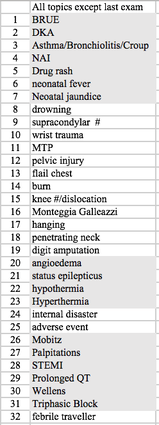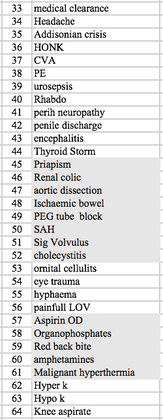What will be on the exam for the FIRST sitting 2019?
My predictions for the last written exam, were quite successful: almost 50% of suggestions were on.
If you think like the examiners do, then it's very doable. That is the main reason for getting you to write questions.
When it come to the OSCE's(www.OSCE.com.au), half of the stations were predicted. Imagine how good it would feel, to have studied half of the questions that come up on the paper on the paper, or walk into a room and get asked the same OSCE you practiced and discussed.
There are a few things that make prediction easier:
When trying to predict the exam I am making a calculated guess based on the exam matrix that I have.
Don't just study the lists I give. They are there for you to spend some extra time on.
I usually put 2 lists together: The 30 topics list and the major list, seen below.
HOW TO STUDY WITH 4 WEEKS TO GO
The list gets put out 4 weeks before the exam, so you can do the final lead-up. In the countdown leading up to the exam, this would be my preparation approach. You will have your own approach and that's fine, because you prepare in your own way. As long as you look at the list below and make sure you have reviewed these topics, it doesn't matter. Here is a suggested approach:
4 WEEKS TO GO: Put a massive week plus a day or two into filling as many gaps as possible, concentrate on the big ticket items from your revision.
3 WEEKS TO GO: Look at the top 64 I have included below and ensure that these are part of the topics you have studied and have summaries of, as they seem to come up quite regularly.
2 WEEKS TO GO: Go over the top 30 I have included below and make sure that you know these. Now I can't guarantee they will come up, but I will say that quite a few of them will.
THE WEEK BEFORE THE EXAM: Go over your notes and think about how a question might be phrased. Think of drug dosages(but don't memorise endless infusion rates etc). Look at the admin questions and remember the general approach to all admin etc...
Remember what's important; ECGs, ABGs, X-rays, Paeds, Trauma will be there as will O&G.. all those things we have said. This final week is about getting everything systematised in your brain, so you can think of differentials.
The exam is big on a descriptive stem and then asking for Differentials and then Management.
If you can't think of a differential have an approach as below:
Differentials list:
Then go get-em!
If you think like the examiners do, then it's very doable. That is the main reason for getting you to write questions.
When it come to the OSCE's(www.OSCE.com.au), half of the stations were predicted. Imagine how good it would feel, to have studied half of the questions that come up on the paper on the paper, or walk into a room and get asked the same OSCE you practiced and discussed.
There are a few things that make prediction easier:
- There are a limited set of topics that can be asked as an SAQ and they repeat
- Knowledge of how the repetition cycle works.
When trying to predict the exam I am making a calculated guess based on the exam matrix that I have.
Don't just study the lists I give. They are there for you to spend some extra time on.
I usually put 2 lists together: The 30 topics list and the major list, seen below.
HOW TO STUDY WITH 4 WEEKS TO GO
The list gets put out 4 weeks before the exam, so you can do the final lead-up. In the countdown leading up to the exam, this would be my preparation approach. You will have your own approach and that's fine, because you prepare in your own way. As long as you look at the list below and make sure you have reviewed these topics, it doesn't matter. Here is a suggested approach:
4 WEEKS TO GO: Put a massive week plus a day or two into filling as many gaps as possible, concentrate on the big ticket items from your revision.
3 WEEKS TO GO: Look at the top 64 I have included below and ensure that these are part of the topics you have studied and have summaries of, as they seem to come up quite regularly.
2 WEEKS TO GO: Go over the top 30 I have included below and make sure that you know these. Now I can't guarantee they will come up, but I will say that quite a few of them will.
THE WEEK BEFORE THE EXAM: Go over your notes and think about how a question might be phrased. Think of drug dosages(but don't memorise endless infusion rates etc). Look at the admin questions and remember the general approach to all admin etc...
Remember what's important; ECGs, ABGs, X-rays, Paeds, Trauma will be there as will O&G.. all those things we have said. This final week is about getting everything systematised in your brain, so you can think of differentials.
The exam is big on a descriptive stem and then asking for Differentials and then Management.
If you can't think of a differential have an approach as below:
Differentials list:
- Traumatic
- Inflammatory
- Neoplastic
- Vascular
- Infective
- Metabolic
Then go get-em!
30 Topics List
|
The list of 25 topics that I think will be on this exam:
1 Kid with a wheeze 2 NAI 3 Rash...perhaps measles 4 DKA 5 Drowning 6 Pelvic fracture 7 Monteggia/Galleazzi 8 Flail Chest 9 Hanging 10 Penetrating neck injury 11 Adverse event 12 Internal Disaster 13 Hypothermia/Hyperthermia 14 Blocks: Mobitz 15 Wide Complex Tachycardia- beware hyperK |
16 HONK 17 Thyroid Storm 18 Febrile Traveller 19 Priapism 20 Pre-ecclampsia 21 Ischaemic Bowel 22 Limb ischaemia 23 Hyphaema 24 Loss of vision 25 Wrist Injury 26 Digoxin Toxicity 27 Serotonin Syndrome 28 Status Epilepticus 29 Headache 30 Testicular Pain |
The Major List
This is a list of 60 or so topics that have been present in the last few exams and there is a high chance that they will repeat.

